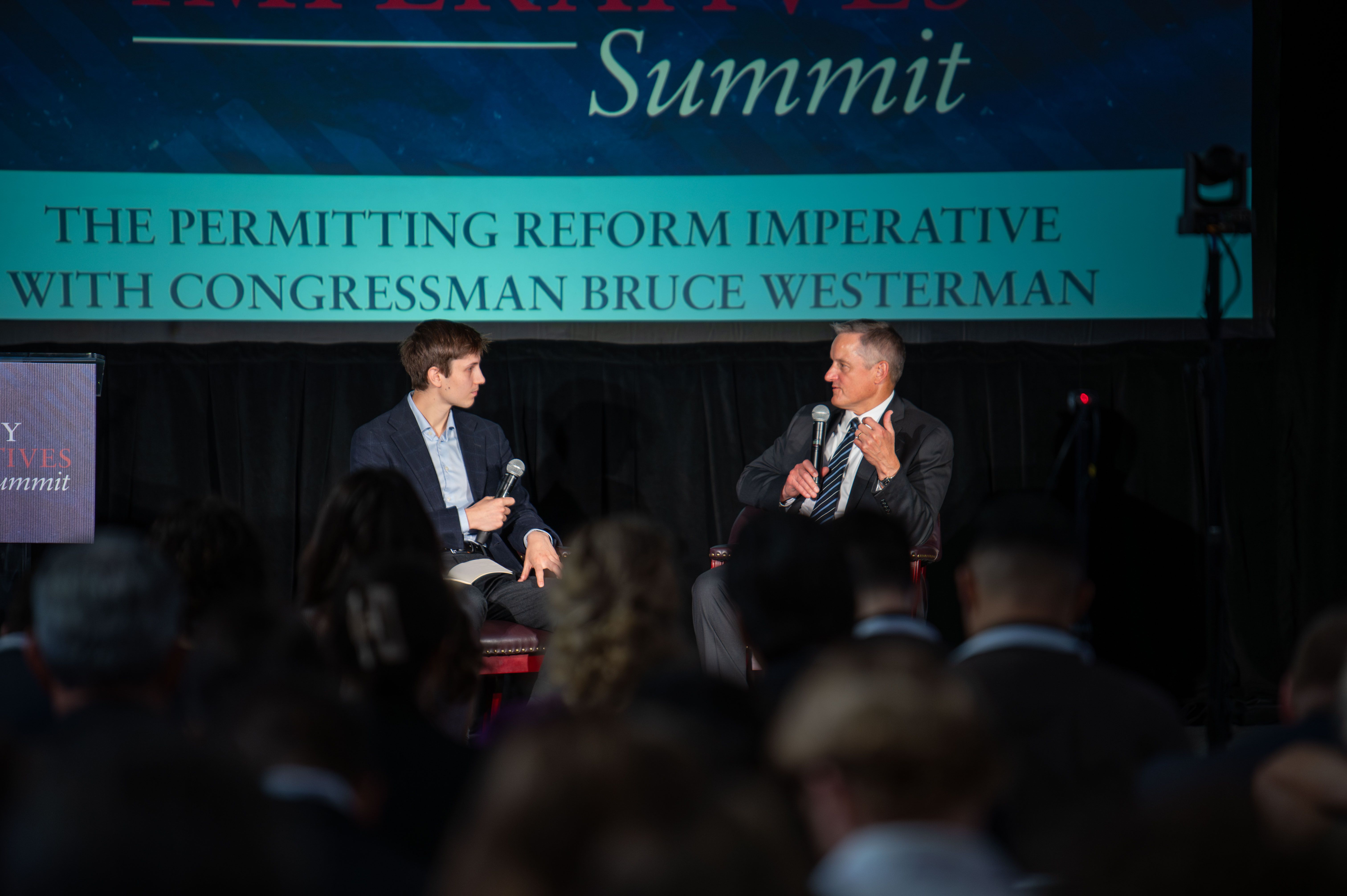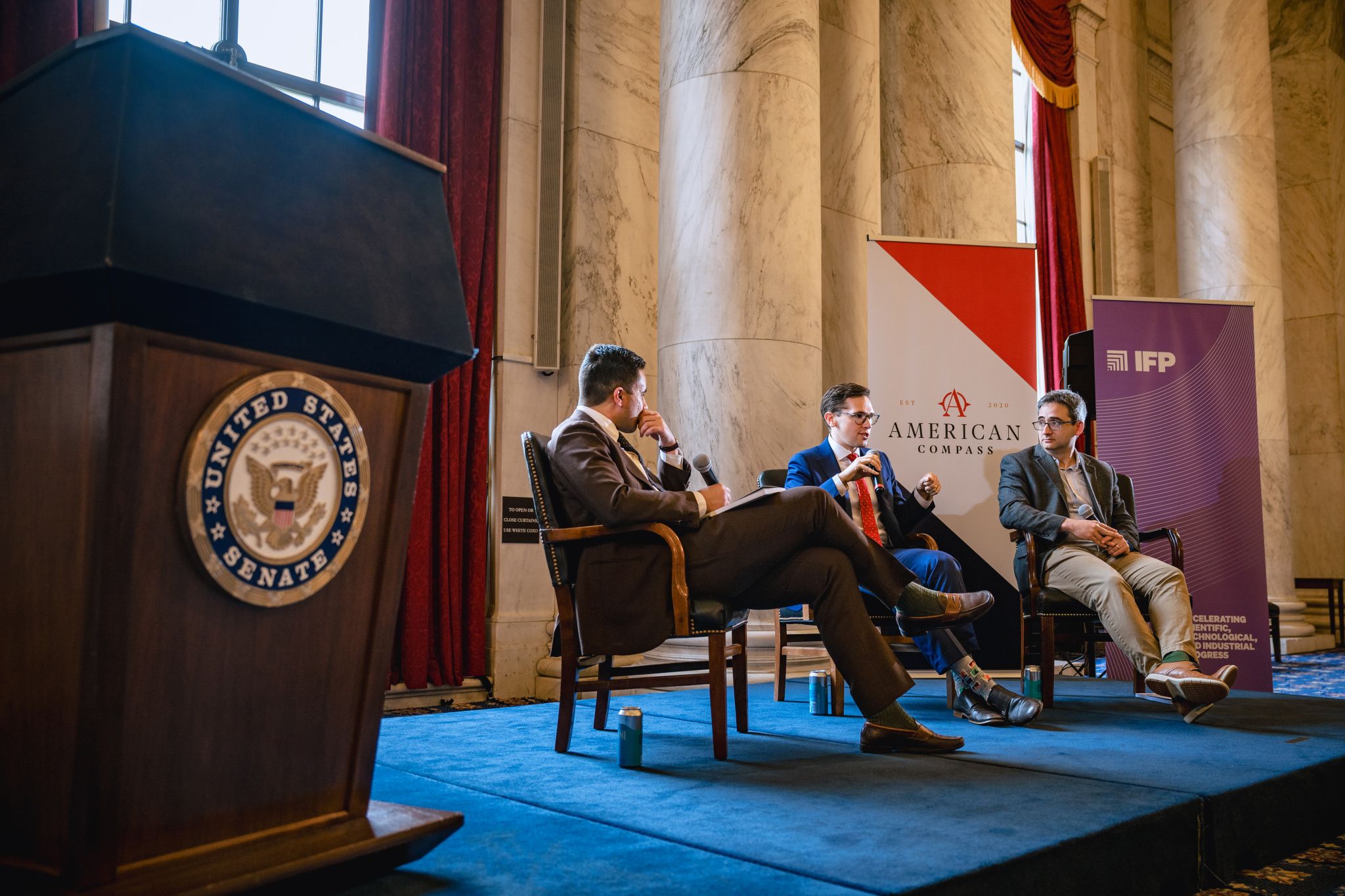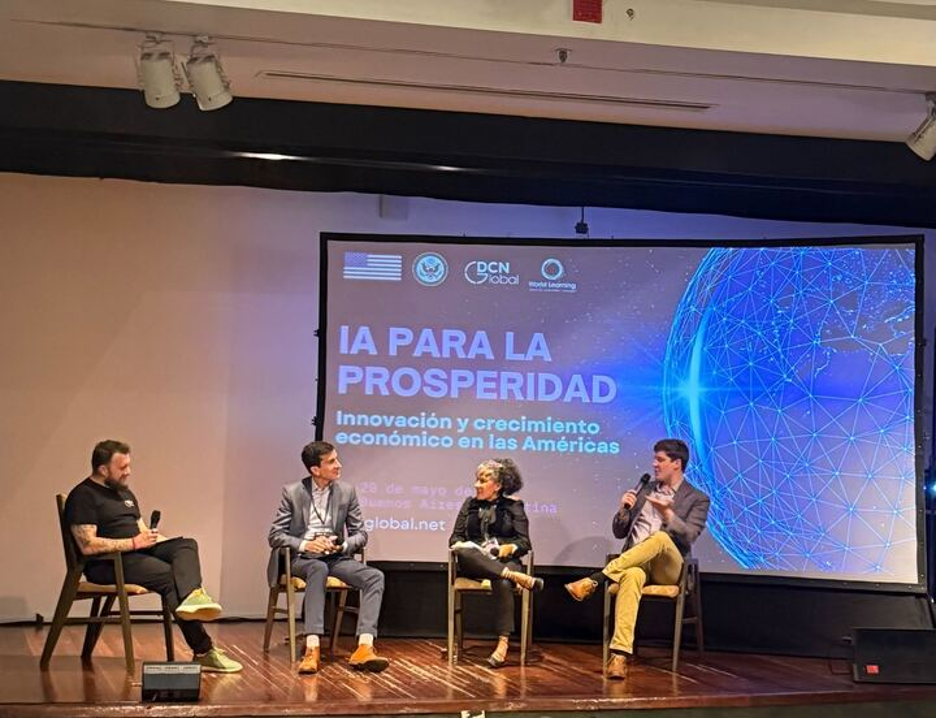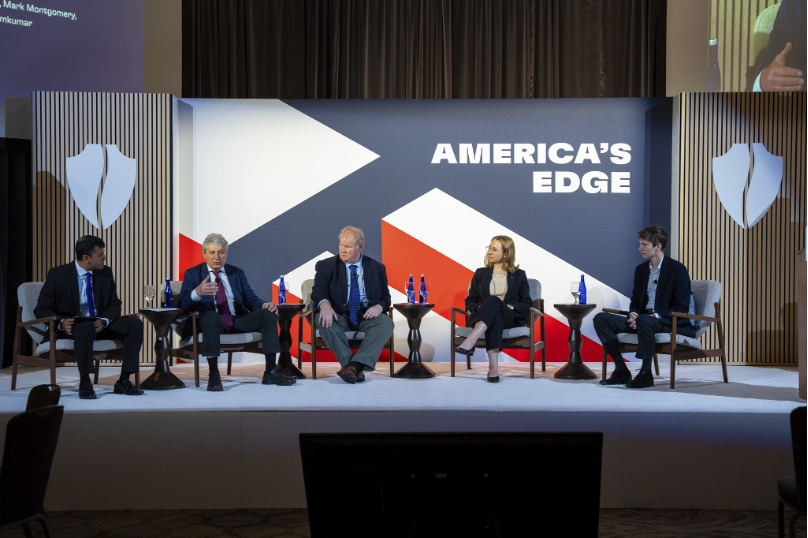
Dear friend of FAI:
I’m excited to share with you our recent work at the Foundation for American Innovation. It’s been an energetic quarter, as the FAI team continues to strengthen national security, improve American governance, and keep America at the forefront of technological dynamism.
The team continues to grow. This quarter we welcomed Director of Governance Soren Dayton, Director of Policy Programs Sophia Brown-Heidenreich, Operations Manager Evan Riggs, Research Fellow Samuel Roland, Non-Resident Senior Fellows Chris Massey and Charles Duan, and Non-Resident Fellows David Cowan, Quade MacDonald, and Travis Scholten. We also have a number of positions open—if you think you might be a good fit, please consider applying.
A growing team means a broader range of views at FAI. With our open voice policy, we embrace debate within the scope of our mission and vision for an optimistic future.
We’re getting ready for our American Innovation Gala on November 13 in Washington, DC. It will be an evening honoring the people and ideas shaping the future of the American experiment. Tickets and sponsorships are available; we hope you can join us.
Research
Reports, Testimonies, and Letters
With the Institute for Progress, American Compass, and the New American Industrial Alliance Foundation, we released the Techno-Industrial Policy Playbook, a collection of policy proposals for industrial power, national security, and frontier innovation. The playbook features several members of the FAI team, including Josh Levine, General Counsel and Senior Fellow Tim Hwang, Senior Fellow Emmet Penney, Chief Economist Sam Hammond, Research Fellow Lars Erik Schönander, Director of Infrastructure Policy Thomas Hochman, and Non-Resident Fellow Kelvin Yu. The playbook was covered in the Washington Examiner, Politico, the Not Boring newsletter, and elsewhere.
In an op-ed for the New York Times, Sam Hammond argued that the key to rebalancing America’s trade with the rest of the world isn’t tariffs, but rather export capacity. Sam writes, “Whatever the Trump administration does for industrial support, above all it must back innovative firms with export potential and not coddle unsuccessful but politically connected ones.”
In an op-ed for the Washington Post, Thomas and the Institute for Progress’s Pavan Venkatakrishnan warned that by cutting important energy loan and tax credit programs, House Republicans risk wrecking President Trump’s goal of a nuclear renaissance. They argue that Congress can either “preserve the proven tools, such as loan guarantees and transferrable tax credits, that unlock private investment in the nation’s most strategic energy assets, or … pull the rug out from under the reactors, heat reservoirs and lithium mines necessary for American energy dominance.”
Senior Fellow Dan Lips testified before the House Committee on Oversight and Government Reform, Subcommittee on Delivering on Government Efficiency. He argued that Congress should use its legislative and appropriations powers to implement lasting efficiency reforms and reduce waste, fraud, and abuse, and showed how such efforts could be informed by the Government Accountability Office and past bipartisan reforms.
Thomas led a coalition letter in support of the Energy Department’s Loan Programs Office, warning that funding cuts would hamper the administration’s goals of enabling nuclear power development, revitalizing domestic mineral production, and modernizing the grid and gas systems. The letter received a write-up in the New York Times.
Thomas made a similar argument in a letter to the editor in the Wall Street Journal, warning that “America’s energy future and the president’s agenda depend on a robust LPO to fuel innovation and maintain our competitive advantage.”
In American Affairs, Policy Analyst Kevin Hawickhorst contributed an essay on the history of government accounting in the 20th century and its lessons for rebuilding state capacity today. He argues that reformers need to know what good government processes look like, and they need a vision of how to convince the government to adopt them.
In the same issue of American Affairs, Emmet contributed a review of a recent history of electrification in the U.S. He argues that calls for “democratizing” energy policy overlook the fact that governing the grid is an exceptionally demanding task, in which many want the juice without being on the hook for the squeeze.
Samuel Roland published a report, “Less Red Tape, More Green Space: How the Council on Environmental Quality Can Overhaul Permitting.” He argues that the current regulatory confusion around environmental permitting offers a chance for the Council on Environmental Quality to develop a better approach to environmental review. Pursuing such reforms will require CEQ to adopt four key roles: legal advisor, data repository, agency coordinator, and executive publicist.
Josh published a report with the Cato Institute, “Opportunity Costs of State and Local AI Regulation.” He argues that rather than rushing to expand the government’s reach on AI, lawmakers should take stock of the available regulatory tools and seek to understand where states and localities have regulated other general-purpose technologies. Josh presented his paper at a panel discussion hosted at Cato.
We published a guest paper by University College London’s Sarosh Nagar, the Carnegie Endowment for International Peace’s Scott Singer, and the University of Cambridge’s Nitarshan Rajkumar. “The Closing Window to Win, Part I” argues that American AI leadership requires a global strategy for full-stake diffusion. A forthcoming companion paper will present a united, whole-of-government export promotion strategy.
Senior Fellow Evan Swarztrauber and Director of Technology Policy Luke Hogg submitted a comment to the Federal Communications Commission. They offer recommendations for rules that the FCC should delete or reform to minimize unnecessary burdens on businesses, free up capital for higher and better uses, and increase government efficiency.
Evan led a coalition letter in support of the Department of Justice Antitrust Division’s full access to estimated merger filing fees. He argues that fees enable vital antitrust and law enforcement efforts that have enjoyed widespread, bipartisan support across administrations.
Josh submitted a comment to the Federal Communications Commission on the review of submarine cable licensing. He argues that licensing updates should focus on streamlining regulatory requirements to accelerate licensing timelines and improving information-sharing within the government.
Thomas led a coalition letter in support of the Loan Programs Office and the Sections 45U, 45Y, and 48E tax credits, arguing that reliable nuclear energy, geothermal, hydropower, and energy storage will require a stable federal policy foundation. The letter was covered in the New York Times and Reuters.
We also submitted several congressional appropriations testimonies:
- Dan submitted testimony to the House Subcommittee on National Security, Department of State and Related Programs, recommending that the State Department’s Bureau of Consular Affairs prepare reports on its role in educating students about American civics and vetting international students who apply for F and M visas.
- Dan submitted testimony to the House and Senate Subcommittees on Labor, Health and Human Services, Education, and Related Agencies, encouraging the subcommittees to modernize the federal education R&D enterprise, establish transparency about K-12 education, and create tools to improve students’ learning opportunities.
- Dan submitted testimony to the Senate Subcommittee on the Legislative Branch, recommending the inclusion of several requirements in the report accompanying the FY2026 funding bill to increase the Government Accountability Office’s return on investment.
- Dan submitted testimonies to the Senate Subcommittee on the Legislative Branch and Subcommittee on Commerce, Justice, Science and Related Agencies, recommending that they support the National Science Foundation’s education R&D programs.
- Luke submitted testimony to the House Subcommittee on National Security, Department of State and Related Programs, arguing for continued funding for the Open Technology Fund.
- Robert submitted testimony to the House Subcommittee on Labor, Health and Human Services, Education, and Related Agencies, recommending that the Department of Education provide guidance to Congress on how to transfer legal authority for oversight of Section 117 of the Higher Education Act of 1965 to the Department of Justice.
- Lars submitted testimony to the Senate Subcommittee on Agriculture, Rural Development, Food and Drug Administration, and Related Agencies, recommending that the subcommittee require the Department of Agriculture to reform the Agricultural Foreign Investment Disclosure Act and protect U.S. farmland from dangerous foreign investments.
- Lars submitted testimony to the Senate Subcommittee on Defense, recommending a requirement that the Department of Defense submit a report on the state of the Pentagon’s Small Business Innovation Research program.
We recently made it official FAI policy that we welcome all bots and web crawlers via our robots.txt file, inviting them to access and scrape our content for building AI tools (or anything else). As Research Fellow Josh Levine explains in a blog post, this policy follows our longstanding support for free information and a free internet.
Commentary and Impact
Several policies that our scholars have engaged on saw progress this quarter.
- The Senate Committee on Energy and Natural Resources has moved to fund the Department of Energy’s Loan Programs Office and maintain the tax credits for nuclear, geothermal, hydropower and energy storage, in line with the recommendations we made in our two coalition letters.
- Many of the Trump administration's efforts to prevent fraud and misspending—such as tightening the Treasury Department's internal controls over federal spending, reducing the federal government's real property holdings, and streamlining regulations—are broadly consistent with our report published last year, “An Efficiency Agenda for the Executive Branch.”
- The House Leg Branch bill includes language requiring the Government Accountability Office to put deadlines on its recommendations, which Dan has called for.
- The Council on Environmental Quality’s first round of NEPA guidance reflects recommendation from Thomas for a “two-part test” to determine what projects should go through NEPA.
- We’ve warned about U.S. higher education’s vulnerability to foreign, and especially Chinese, influence. In particular, we have called for better enforcement of Section 117 of the Higher Education Act of 1965, which requires postsecondary institutions to disclose payments from foreign sources. President Trump recently signed an executive order requiring improved compliance with Section 117. A bill recently introduced in the House by Representative Tim Burchett would codify the executive order.
- We’ve also warned about the cybersecurity risks posed by the U.S. government’s dependence on Chinese drones and have called for better oversight of federal and state drone fleets. To that end, another recent executive order requires the Federal Acquisition Security Council to publish a Covered Foreign Entity List identifying drone companies that pose supply chain risks.
- President Trump’s budget request calls for an additional $750 million to support nuclear energy. Emmet has written widely about the role that nuclear will need to play in any effort to achieve American energy abundance.
Our commentary included the following:
- Robert Bellafiore, “Eat Your AI Slop or China Wins,” in the New Atlantis
- Lars Erik Schönander, “Fixing the Department of Defense’s SBIR Commercialization Pipeline,” in RealClearDefense
- Emmet Penney, “We’re Not Ready for the AI Power Surge,” in the Free Press
- Tim Hwang and Josh Levine, “In the AI Race, Copyright Is the United States’s Greatest Hurdle,” in Lawfare
- David Cowan, “Stealing ‘Abundance,’” in Commonplace
- Robert Bellafiore, “Alex Karp’s Technopolitik,” in Commonplace
- Farrell Gregory, “The Industrial Hollows,” in Commonplace
- Lars Erik Schönander, “Reining in the ‘Unaccountability Machine,’” in Commonplace
- David Cowan, “Who Gives a Ship,” in Commonplace
- Robert Bellafiore, “Can Natalism Be Normal?”” in Compact
- Emmet Penney, “Trump Must Fix the Grid,” in Compact
- Emmet Penney, “Spain’s Renewable Energy Nightmare,” in Compact
- Emmet Penney, “The GOP Might Kill Trump’s Nuclear Renaissance,” in Compact
- Thomas Hochman, “America’s Industrial Comeback Depends on the 45X Tax Credit,” in RealClearPolicy
- Luke Hogg, “Trump’s Move to Save This Fund Will Strengthen Foreign Policy,” in City Journal
- Robert Bellafiore, “The Age of Economic Warfare,” in City Journal
- Emmet Penney, “The Secret Weapon for Energy Dominance: Nuclear Waste,” in The American Conservative
- Dan Lips, “How Rand Paul Can Seize a Golden Opportunity To Cut Federal Waste,” in The Federalist
- Lars Erik Schönander and Luke Hogg, “States Have a TP-Link Problem,” in the National Interest
- Lars Erik Schönander and Luke Hogg, “Microsoft Aided an Adversary’s AI Ambitions,” in the National Interest
- Josh Levine, “Securing America’s Digital Lifelines,” in the National Interest
- Robert Bellafiore, “Missing the Forest for the Tweets,” in National Review
- Richard Reisman, “Will We See a Sociotechnical Dystopia Soon?” in Elon University’s Imagining the Digital Future Center’s Being Human in 2035: How Are We Changing in the Age of AI?
- David Cowan, “What the Early Years of Air Power Can Tell Us About Mastering Drone Power,” in the Oxford Emerging Threats Journal
- Luke Hogg, “Enabling a Thriving Middleware Market,” in Just Security
- Farrell Gregory, “Can the Three Seas Initiative Save the US-Ukraine Critical Materials and Minerals Deal?” in Royal United Services Institute
- Farrell Gregory, “Commerce, Not Chaos: A New Vision for the Middle East,” in the Oxford Middle East Review
- Farrell Gregory, “Learning from the First World War to Avoid the Next One,” in the Oxford Diplomatic Dispatch
- Joshua Levine, “New Council on National Security Bolsters the FCC’s Arsenal against China,” in Broadband Breakfast
- Luke Hogg, “Fixing BEAD is Worth Minor Delays,” in Broadband Breakfast
- Evan Riggs, “The DOGE Days of Summer,” at The Burn
- Evan Swarztrauber, Don’t Kill the Golden Wi-Fi Goose,” in the Washington Reporter
- Emmet Penney, “Prairie Power: Why Illinois Needs Nuclear Energy Now,” in Daily Herald
- Dan Lips, “Using AI to Make Research More Accessible and Ultimately Improve Learning,” on the Alliance for Learning Innovation blog
- Ryan Khurana, “How the Federal Government Can Put AI on the Map,” in the Ottawa Citizen
- Dan Lips, “Congress Should Use AI to Identify Unnecessary Regulations”
- Dan Lips, “Congress Should Move Section 117 Enforcement to the Department of Justice”
Our writers were also busy on their Substacks and blogs:
- At State Capacitance, Kevin wrote about executive branch reorganization, paperwork reduction under President Truman, and the D.C. Circuit.
- At Green Tape, Thomas wrote about permitting reform in reconciliation, the Pentagon’s energy needs, and lessons from one year in DC.
- At Second Best, Sam Hammond wrote about Hegel and the AI mind, the Trump administration’s tariff strategy, and the labor theory of value.
- At Legislative Procedure, James wrote about Republicans’ current policy baseline, the parliamentarian’s role in the Senate, and rescission bills.
- At Prototyping Politics, Soren wrote about national emergencies, the abundance agenda’s opposition to procedure, and the coalition between Republican moderates and the New Right.
- At Nuclear Barbarians, Emmet wrote about Spain’s blackouts and nuclear reforms in Colorado.
Highlights among our media hits included the following:
- Max spoke to the Daily Caller about Elon Musk and the relationship between Silicon Valley and Washington, DC.
- Sam Hammond spoke to Politico about conservative technologists’ perspectives on DOGE.
- Thomas spoke to Decouple Media about what the recent flurry of nuclear executive orders mean for American energy.
- Kelvin was interviewed by TBPN about the Techno-Industrial Policy Playbook.
- Evan spoke to the Washington Post about the efforts of Elon Musk’s Starlink to expand internationally.
- Sam Hammond spoke to the Washington Post about President Trump’s proposed Greenland takeover.
- Vice President for Policy James Wallner spoke to Blaze Media about the Senate parliamentarian’s analysis of the Senate reconciliation bill.
Fellowships
We recently kicked off the inaugural Conservative AI Policy Fellowship, our six-week, part-time program for conservative policy professionals in Washington D.C. seeking to understand AI and the policy debates surrounding emerging technology. The 20 participating fellows come from think tanks, government, industry, and academia.
Over the course of the fellowship, they will hear from experts on a variety of AI-related policy issues, from compute governance and energy requirements to AI’s social implications and national security threats.
Events
This quarter, we hosted events with some of our favorite organizations and thinkers.
We partnered with the American Conservation Coalition and American Affairs to host the Energy Imperatives Summit, a two-day conference on reindustrialization and energy abundance. The Summit featured Secretary of Energy Chris Wright and several members of Congress, and the first evening concluded with an after-hours Policy Power Party. In an accompanying op-ed for RealClearEnergy, Thomas explained why America needs energy abundance.

With the Institute for Progress, we hosted a “think tank hackathon” to develop tools for incorporating LLMs to think tanks’ day-to-day operations. Take a look at people’s projects here.
To celebrate the launch of the Techno-Industrial Policy Playbook, we convened a private salon dinner and a public reception on the Hill featuring Senator Todd Young. Executive Vice President Max Bodach moderated a conversation with Oren Cass of American Compass and Caleb Watney of the Institute for Progress.

We hosted a panel discussion in DC on Congress after Chevron and the challenges and opportunities facing Congress after the overturning of Chevron deference. The event built on last year’s symposium with the Antonin Scalia Law School’s C. Boyden Gray Center for the Study of the Administrative State.
We co-hosted a salon lunch on the “hillbilly antitrust" movement and the future of conservative antitrust policy.
On the eve of the Hill and Valley Forum, we hosted the “American Innovation Reception” to bring together DC policymakers and Silicon Valley innovators.
In New York, we partnered with the Manhattan Institute for “The Tech Right Wants a Word,” a reception before NYC Tech Week.
We partnered with Freethink for a private dinner with technologists, investors, and policy architects working in frontier tech.
We co-hosted the Tony Blair Institute’s closed-door event, Promote and Innovate—What Global Leadership in AI Looks Like. Sam Hammond and Non-Resident Senior Fellow Keegan McBride were panelists at the event.
Other highlights among the events our scholars spoke at included the following:
- Josh spoke at Public Knowledge’s Emerging Tech Showcase 2025 about access to training data and its importance for AI model competition.
- Dan joined a panel at the Association of Defense Community's annual summit to discuss the need for improved oversight of foreign payments to U.S. colleges and universities.
- At the AI for Prosperity: Innovation and Economic Growth in the Americas conference in Buenos Aires, Luke spoke on a panel about “AI Regulation vs. Innovation – Striking the Right Balance.”

- At the Center for a New American Security’s conference, America's Edge: Forging the Future, Thomas moderated a panel on “Powering the AI Revolution.”

- Sam Hammond led a salon on “The Phenomenology of AI” with Interintellect.
- Farrell spoke at a conference on “Mining Battery Metals: What, How, Sustainable?” hosted by the University of St. Andrew’s.
- Farrell moderated discussions at the Oxford Critical Minerals Summit, a conference about the challenges to securing a stable supply of critical minerals.
- Luke joined the Congressional Internet Caucus academy for a panel on misinformation, censorship, and hate speech online.
- Dan spoke to the Indiana Philanthropy Alliance about opportunities to apply evidence-based best practices to improve K-12 education.
- At the Estonian embassy, Sam Hammond interviewed Joel Burke about his book Rebooting a Nation: The Incredible Rise of Estonia, E-Government and the Startup Revolution.
Podcasts
On The Dynamist, Evan brought on some of today’s most important thinkers and doers to discuss the future of technology, governance, and innovation. Recent episodes have featured the Federal Trade Commission’s Mark Meador, former FTC chair Lina Khan, and a16z’s Katherine Boyle.
Senior Media Fellow Marshall Kosloff and Saagar Enjeti have continued hosting The Realignment, which is sponsored by FAI. They’ve had conversations in recent months with figures such as Facebook cofounder Chris Hughes, former Secretary of Education John B. King, and Council on Foreign Relations scholar Rush Doshi.
On Nuclear Barbarians, Emmet brought on the Nuclear Energy Institute’s Benton Arnett, the Texas Nuclear Alliance’s Andrew Kirima, and hard science fiction comic book writer Aubrey Sitterson.
On Politics in Question, James interviewed the Brookings Institution’s Jonathan Rauch, Stanford University’s Didi Kuo, and FAI’s own Soren Dayton.
Book Recommendations
The FAI team has been getting into some great books in recent months. Here are a few that members of the FAI team recommend:
- Apple in China: The Capture of the World's Greatest Company, by Patrick McGee
- Arsenals of Folly: The Making of the Nuclear Arms Race, by Richard Rhodes
- The Dark Side of Camelot, by Seymour M. Hersch
- Troilus and Criseyde, by Geoffrey Chaucer
- The Lever of Riches: Technological Creativity and Economic Progress, by Joel Mokyr
- The Novelist: A Novel, by Jordan Castro
- Vietnam: A History, by Stanley Karnow
- Cybernetic Revolutionaries: Technology and Politics in Allende's Chile, by Eden Medina
- Plato: An Introduction, by Paul Friedländer
- Pieces of the Action, by Vannevar Bush
- Dreams of El Dorado: A History of the American West, by H.W. Brand
- Code: And Other Laws of Cyberspace, Version 2.0, by Lawrence Lessig
- Raiders, Rulers, and Traders: The Horse and the Rise of Empires, by David Chaffetz
- A Wild Sheep Chase, by Haruki Murakami
- Nixon's White House Wars: The Battles That Made and Broke a President and Divided America Forever, by Patrick J. Buchanan
You can also see a longer list of our recommendations on our Bookshop page.
Coming Soon
We have many projects in the works and are excited about the next few months. We’ll be publishing reporters on lessons from President Clinton’s civil service reforms, the technical and legal bottlenecks limiting mobile competition, and more. And be sure to get your ticket for the American Innovation Gala on November 13!
Thank you for following our work. We appreciate your continued interest in FAI and welcome any questions or feedback.
Sincerely,
Zach Graves
Executive Director
Foundation for American Innovation